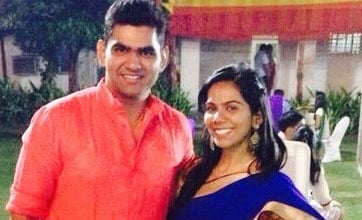In the medical industry, they say you always have one instance that’ll eternally stay with you. It could be a moment, a patient is saved, a heartbreaking turn of events. For Swati Kataria, it was the presence of one man.
Swati roams the halls at the Medanta Medical Institution in Gurgaon, India, working as a clinician inside the green windows of the gargantuan complex. She walks purposefully around the state-of-the-art ‘medicity’, tending to patients’ needs. It was three years since Swati last provided comfort for those suffering in the gastro department. She was now back on track, raring to fulfil her dream of becoming a successful clinician.
Then she sees him.
The old man sits in his hospital bed, patiently waiting for a liver transplant that can help him overcome hepatitis C. Before Swati went away, the man was there, surrounded by family. But three years later, only the man sits upright in his bed. He has since lost both his wife and his son, yet nothing has changed while he remains on the waiting list for a liver transplant. There’s a reason why this moment strikes so heavily at Swati’s heart – she has just returned to work after undergoing her own liver transplant surgery.
But Swati doesn’t share this situation with just the patient in the Medanta; the World Health Organization (WHO) estimates at least six million Indian citizens are currently infected with hepatitis C, while Indian Pediatrics suggests there are around 2000 liver transplants completed each year for Indian citizens. While the COVID-19 pandemic created a medical panic in India last year, the presence of hepatitis and liver illnesses in the country has remained constant over time.
Dr Poonam Khetrapal Singh, the WHO Regional Director for South-East Asia, says the number of Indian people living with hepatitis variants could be even more. “75 per cent of those with chronic hepatitis C are unaware that they are affected,” Dr Singh says.
It was a harsh blow for Swati, who was forced to realise the gravity of her own journey, upon seeing the man in the Medanta. “He was in more pain, emotionally and physically, and had no one to simply hold his hand,” Swati recalls, emotion sobering her usually cheerful expression.
Now living in lockdown-induced Melbourne with her sister, Swati has experienced many different medical settings while struggling to overcome the likes of jaundice, excessive tiredness and a lack of appetite. It all began in 2009, where she went from being “very proud” that she had never been a sick child” in a “very loving family” to a second-year university student being diagnosed with acute liver failure and dengue fever. Not much later, doctors detected cirrhosis, and the end stage of liver damage. When doctors concluded her acute liver failure was an autoimmune condition, struggled to comprehend the severity of her illness.
“It came all of a sudden, right before then I had never been sick in my life. I took it pretty easy; I just didn’t realise how serious the matter was” Swati reflects.
This came as a serious shock to Swati and her close-knit family, who up until then had no generational history of liver disease or hepatitis. Her parents immediately put on a fearless persona for their middle child. Her siblings began to show even more love and devotion for their sister. Upon reflection, Swati believes she “could have made some big decisions” in her life then, but refused to take her condition seriously. Before she knew it, Swati was one of the many Indian citizens each year being told by doctors to consider getting a liver transplant. Unlike her compatriots, Swati was still only 19.
Waiting in line for a donation of any organ can take a long time – Indian residents can be put on hold for a liver donation for up to “a year” according to Liver Transplant India. Facing these intimidating wait times, Swati decided to live on medications for five years. But this decision only led to more issues along her journey. Before long Swati was diagnosed with ascites, meaning her abdomen retained dangerous amounts of water and fluid, and gastrointestinal infections meant she had to have her spleen embolized.
It was around this time that the medical system failed Swati. Doctors “went for the money” instead of providing proper care, and tried to exploit Swati’s parents, who lacked education growing up. “The first doctor tried to refer me on to a big hospital where he would get a commission, rather than letting me get the best healthcare possible,” Swati says, a frustrated edge steeling her eyes.
It was March 2014 when Swati was told to search for a liver donor. While she was still “young and healthy”, she was told to find someone willing to gift a liver. Swati didn’t have to look very far.
Swati wasn’t surprised when all her family raced to get compatibility tests for a liver transplant. But when her younger brother Manmeet came back as a suitable donor, she had no say in the decision. “My brother never let anyone else try much for it, he just kept saying he was going to give,” Swati states with a grin.
It was a brave move for Manmeet, but after a month he was pain-free, while Swati’s recovery has never truly finished. Ever since, Swati’s newly strengthened immunity means she suffers from cellular rejections, giving her similar symptoms to what she first presented with as a 19-year-old, every six months. To distract herself, she moved on a whim to Brisbane, spending two years there before joining her older sister in Melbourne just before the COVID-19 pandemic touched down in the city.
Despite the long-term consequences of her journey, Swati can only grin and laugh when saying that “if there is something weird or extreme that’s going to happen”, it will befall her. It’s the type of attitude that has taken Swati through many challenges in her young life. And it’s the type of attitude that will propel her on, even when being confronted by reminders of her own difficult journey, such as that moment in Gurgaon’s Medanta.
“I used to beat myself up for a very long time thinking I’m not achieving my dreams, and that I’m late to my goals in a very competitive world, but I’ve had quite a few obstacles in my life and always had a smile on my face during them. I think I’ve been brave up until now, so it’s been a good journey,” Swati reflects.
Written and produced by Sean Mortell, RMIT journalism student, Capstone Project.










